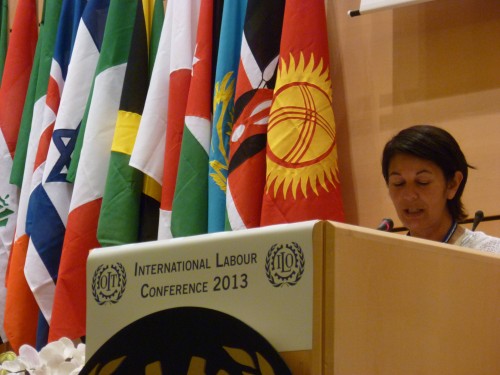Waste picker representatives from Brazil, Colombia and India are part of the WIEGO delegation at the 102th International Labour Conference in Geneva to bring attention to waste picking and recycling as a key sector for green jobs and sustainable development. Please see below the speech of Nohra Padilla, of Colombia, and Alex Cardoso, of Brazil, presented at the plenary.
Dear partners,
My name is Nohra Padilla. I have been a waste picker since I was eight years old. I am the third generation of my family to survive by recovering material found in garbage.
More than 24 million of us are working around the world: young people, women, older people, and migrant workers. We are the product of economic crises, and misguided technological and industrial development. We work at recovering and managing waste, collecting, transporting and cleansing a large amount of materials to be transformed into consumer goods. We are at the bottom of the production chain of recycled, raw materials. We do 90 percent of the work, and in most cases, we do it with no recognition of the extreme misery of our situation. Without our efforts, all those materials would be buried, incinerated or piled in open-air dumps and poured into lakes and ponds that we all need to survive.
We are more than half-a-million waste pickers in five continents, who have joined together as trade unions and other forms of associations where there are no bosses or employees but only fellow workers. For more than 30 years, we have formed national, regional and continental organizations, and more recently we have taken firm steps toward coming together as a global force. We are striving to integrate our efforts with other workers in this value chain that provides thousands of jobs throughout the world to defend our legitimate rights as workers.
Waste pickers who are denied access to garbage are like fishers without fish, or farmers without land. We cannot survive if we are not guaranteed that recyclable materials will remain in our hands, and not in the hands of the capitalist waste management companies that would, for instance, incinerate our sources of income. The struggle continues: by putting business above people, corporations, as our partner Sharan Burrow has stated so well, are a force that is trying to destroy our livelihood.
Without waste pickers, the world would lose enormous savings of energy, water, trees and minerals, and the number of garbage disposal sites would multiply greatly. The work that we do makes some of the most significant positive social, economic and environmental contributions to sustainable development, but we are struggling in the most shameful working conditions and poverty.
As the Director General has reported, the international community has thrown out the false alternative between jobs and protection of the planet. In that sense, we, as waste pickers, are a fine example of creators of self-employment. If we speak only of paper and cardboard, every day each waste picker saves at least one tree and millions of litres of water.
The considerations of the Commission on Sustainable Development will, no doubt, be a concrete step towards securing ILO’s commitment with the demands of our sector regarding sustainable development, the recognition of existing green employment, the creation of new green jobs and a guarantee of decent jobs for everyone.
For these reasons, as the spokespersons for our global members in front of the ILO Commission on Sustainable Development, we are insisting on the recognition of our position as worker partners and not employees as we make the following demands:
1. Recognition that for eight decades waste pickers have made a significant contribution to sustainable development.
2. Change from existing miserable working conditions into decent and self-organized jobs in cooperatives for workers.
3. Strengthen the social technology that is effectively fighting against greenhouse gases, conserving natural resources and energy, and mitigating climate change.
4. Government financing for the necessary infrastructure in the green employment sector to improve and achieve maximum job potential in this important sector.
5. Promote and secure economic justice for this sector to obtain fair compensation for those who work within the public sanitation system, environmental compensation and a fair price for the raw materials that are recovered by waste pickers.
6. Promote an orderly transition in each country to ensure that waste pickers are included in social protection plans, occupational health and safety and in decision making processes that affect their work.
Finally, we thank all the partners who are fervently working alongside us to achieve social and economic justice and opposing the exploitation of all workers.
Our heartfelt thanks!
Alexandro Cardoso
Nohra Padilla
Tweet


